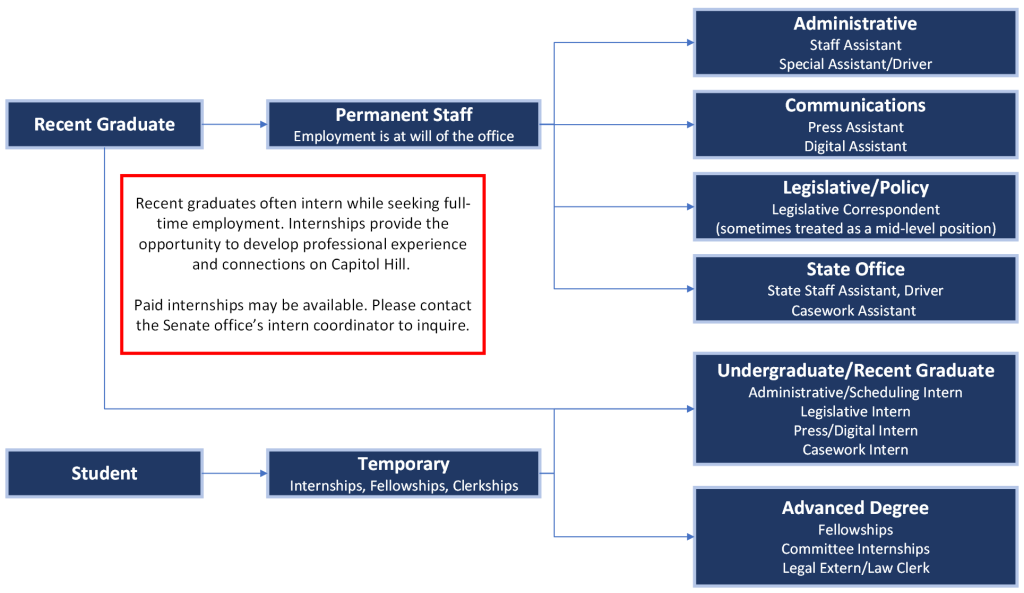To be employed by a Senate employing office in a paid position in the continental United States an individual must:
1. Be a U.S. citizen;
2. Be lawfully admitted for permanent residence and seeking citizenship as outlined in 8 U.S.C. § 1324b(a)(3)(B);
3. Be (i) admitted as a refugee under 8 U.S.C. § 1157 or granted asylum under 8 U.S.C. § 1158 and (ii) have filed a declaration of intention to become a lawful permanent resident and then a citizen when eligible; or
4. Owe allegiance to the U.S. (i.e., qualify as a non-citizen U.S. national under federal law).
Background checks may be conducted at the discretion of the Senate employing office. Additional requirements may apply based on the position and whether a security clearance must be obtained.
It is the job seeker’s responsibility to ensure that they meet one of these requirements to be eligible for Senate employment.
Please see our frequently asked questions below.
Employment Terms and Benefits
Yes. Senate staff are excepted service federal employees under the legislative branch of government. Click here to learn about excepted service.
Each Senate office is an independent employer, responsible for determining their own hiring policies, job requirements, compensation, benefits, and conditions of employment.
Employment is usually at-will, meaning that employment is at the mutual consent of the employee and their employer and may be terminated by either party at any time, with or without cause, provided that such termination does not violate the Congressional Accountability Act of 1995 (CAA), as amended.
Listed below are benefits typically available to Senate employees: *
11 federal holidays and annual leave accruals;
Thrift Savings Plan (TSP), employer-matching contributions;
Federal Student Loan Repayment Program;
Medical, dental, vision, and life insurance;
Flexible Spending Accounts;
Employee Assistance Program;
Training and wellness programs; and
Transit or parking benefit.
Relocation expenses will not be covered.
* Policies and benefits are subject to change at the discretion of the Senate employing office.
The Senate Employment Office does not handle employee benefits. Senate staff may contact the Disbursing Office for more information.
The Senate does not adhere to the Office of Personnel Management’s General Schedule (GS). Instead, each Senate office can independently set their own compensation schedule and benefits. To learn about Senate staff salaries, please read the Congressional Research Service’s reports on Staff Pay Levels for select positions in Senators’ Offices and Senate Committees.
Senate employees are paid semi-monthly (twice a month). Senate staff may contact the Disbursing Office for more information.
No. Although some Senate hiring managers may indicate a preference for applicants with prior internship or work experience in a congressional office, this is not a blanket requirement. If prior Hill experience is required, this will be specified in the vacancy announcement.
Professional and senior staff vacancies–particularly communications or legislative roles–are the positions most likely to require prior Hill experience. These professional staff are not only expected to be knowledgeable in their policy portfolio, but must also demonstrate a deep understanding of the Senate’s legislative process and procedures.
Meanwhile, prior Hill experience may be valued, but not required, in other supporting roles such as junior staff (entry- or mid-level) positions or administrative staff. For these positions, offices may consider applicants with other experience relevant to the position’s responsibilities.
There is usually no requirement for candidates to have been employed with the federal government. Members of the general public who meet the Senate’s employment eligibility criteria may apply for any vacancy posted to the Senate Employment Bulletin.
No. You may apply to work for any Senate office that is of interest to you. However, entry-level individuals and state office applicants are highly encouraged to apply to offices where they have a strong state or regional connection. Senate offices often look to fill these constituent-focused positions with staff who have strong ties to their state. Your strongest state ties may include places where you have lived, studied, worked, or were stationed while in the military.
Due to the political nature of the Senate, hiring managers often look for applicants who exemplify the political and ideological interests of their Senator. Applicants should consider their personal preferences and body of experience, as well as a Senator’s policy priorities to find offices where their interests best align.
When a sitting senator dies or resigns before the end of the term of office, employees of the senator’s office are continued on the Senate payroll at their respective salaries for up to 60 days. Employee duties during that 60-day period are performed under the direction of the Secretary of the Senate.
When a sitting senator’s term ends due to loss in a general election, employees of the senator’s office who are certified as “displaced staff members” are continued on the Senate payroll at their respective salaries for up to 60 days, or until they obtain gainful employment, whichever occurs earlier.
Please work with the hiring manager and the Senate Disbursing Office to ensure that you do not have a break in service and to receive credit for your years of federal service.
Opportunities and Work Environment
Most personal office staff positions are based in Washington, DC. However, every senator also has one or more state or regional office locations. While personal office staff may have many responsibilities, their primary job function will typically fall within one of four areas of operations: administrative, legislative, communications, and constituent services.
The majority, if not all committee staff positions are also based in Washington, DC. Most administrative positions will be non-designated, serving both the Majority and Minority staff equally. Meanwhile, policy and communications positions will likely be under the direction of the Chair, Ranking Member, or other Member on the committee.
Please visit our Position Descriptions resource for more information.
A limited number of nonpartisan opportunities may be available in committee offices. Most of these positions are administrative and serve the Majority and Minority staff equally. Certain committees may also have a limited number of nonpartisan professional staff opportunities. Visit our Position Descriptions resource and the committee’s website to learn more.
Please note that some nonpartisan offices require that staff be impartial in appearance as well as in fact. Therefore, active public participation in political matters, through employment, advocacy, campaign involvement, or social media, may be regarded as a disqualification for employment. In some instances, nonpartisan offices may prefer applicants who have not had prior experience on the Hill or in advocacy.
Offices within the Senate Sergeant at Arms and Secretary of the Senate provide operational assistance or support to Senate offices and staff. These organizations are nonpartisan and employ individuals from a variety of occupations, including acquisitions, administrative support, counseling, cybersecurity, facilities maintenance, graphic design, human resources, information technology, photography, telecommunications, training, and more.
Other nonpartisan legislative branch opportunities can be found here. The Senate Employment Office does not conduct employment activities for these organizations.
Each Senate office determines its own policies and procedures. While many Senate offices have returned to working in-person in Washington, DC, some offices still offer hybrid or remote work opportunities. Please be aware that office policies are at the discretion of the senator and their senior staff.
The Senate is a historic political institution enshrined in tradition. Much of the Senate’s official business is conducted in-person on Capitol Hill. However, senators frequently return to work from their home state when the Senate is in recess. Staff in Washington, DC support their senator’s legislative and oversight obligations, while state-based staff provide constituents with federal agency assistance and develop relationships with members of the community.
Each Senate office operates like an independently-run business. Therefore, every office has its own policies and unique culture. The three Senate Office Buildings in Washington, DC are Hart, Dirksen, and Russell. While floor plans may vary, offices are usually designed with an open concept, so staff can expect to work in close quarters with little expectation of privacy. This cultivates an atmosphere where teamwork and collaboration are valued.
The Senate floor schedule can often be unpredictable. Work often requires extended and unscheduled hours, and staff are expected to prioritize and perform duties in a fast-paced, deadline-driven environment. Successful staff are often flexible and entrepreneurial, and demonstrate a high level of professionalism and discretion. Please review announcements on the Senate Employment Bulletin to learn about other skills or competencies required of Senate staff.
Although the House and Senate collectively make the Congress, each chamber carries out different constitutional obligations. Outlined below, are some of the differences between House and Senate offices.
Congressmen/Congresswomen represent their district of approximately 700,000 constituents and face reelection every two years. Although there are a greater number of House offices, staff levels in each office are much smaller than in the Senate. As a result, House legislative staff may have broader policy portfolios and additional responsibilities. However, House staff frequently move among offices and can progress rapidly in their careers.
Senators represent their entire state and are elected to serve longer, six-year terms. Although there are only 100 senators, personal offices typically employ between 40-100 staff. Since Senate staff levels are significantly higher than in the House, policy staff are able to specialize in narrower portfolios. There is usually less staff turnover in the Senate, and professional staff positions typically require advanced education and more experience with the policy portfolio.
HouseLower Chamber | SenateUpper Chamber | |
Members | – 435 Members– Number of representatives is determined by state population | – 100 senators– Two senators per state, regardless of population |
Representation | – 50 states– District of Columbia and U.S. territories (nonvoting) | – 50 states |
Term length | – Two-year terms– All Members up for reelection every two years | – Six-year terms– Staggered terms, 1/3 of senators up for reelection every two years |
Staff levels | – Approximately 10,000 staff– Member offices: limited to ~18 full-time and four part-time staff; across DC and District offices– CRS House Staff Levels | – Approximately 5,000 staff– Member offices: staff levels vary based on seniority, budget, leadership, etc.– CRS Senate Staff Levels |
To make an informed decision on which offices or environment may be a better fit for your career interests and goals, research the personal or committee offices and network with current or former staff. Networking, in particular, is an excellent way to learn about an office’s culture and gain insight from others’ experiences.
Application Process and Timeline
The Senate Employment Bulletin / Internship Opportunities Bulletin is the official resource for Senate offices wishing to advertise their current job and internship vacancies. The Senate Employment Office publishes vacancy announcements in real-time during business hours. Follow @Senate_Jobs on X (Twitter) for live updates.
Although many third-party job sites “scrape” advertisements from the Senate Employment Bulletin, their information may be obsolete or incomplete. This means that they may contain expired job posts or omit information necessary to apply. Therefore, applicants should always review the Senate Employment Bulletin to ensure the vacancy is still advertised and accepting applications.
The Senate does not function like the private sector, so Senate offices do not typically “front load” their recruitment. If they advertise a vacancy, they are typically looking to fill that position immediately, not six months from now. It is recommended that you apply when you are about two to four weeks from availability for full-time/permanent employment.
The vacancy announcement will include minimum qualifications required to be considered for a position, including required education, experience, skillsets, and more. You should carefully review the vacancy announcement to determine whether you meet these baseline requirements before applying.
View our Senate Recruitment Roadmap for an overview of the Senate recruitment process.
When submitting your application for a vacancy advertised on the Senate Employment Bulletin, follow the application instructions, usually located near the end of the vacancy announcement in bold. A standard application package typically includes a resume and statement of interest or cover letter. Some offices may also request a list of references, writing samples, or unofficial academic transcripts. Please be sure to submit a separate application for each vacancy that you wish to be considered for. Applicant requests for accommodations should be directed to the Senate office’s hiring manager.
Once the application deadline has passed or if there is a rolling deadline, the hiring manager will review applications and contact applicants that they are interested in interviewing. Unfortunately, not all candidates will be contacted due to the high volume of applications received. Senate offices may conduct around two to three rounds of interviews. Some offices may also choose to administer a skills assessment or conduct reference checks near the end of the candidate selection process. Once selection activities are complete, the hiring manager will notify the selected candidate. The timeline for consideration will depend on the hiring office.
Please be aware that the Senate Employment Office is not updated on the status of an application once it is sent to a hiring office.
Response times will often vary since each Senate office has its own timeline for candidate screening, interviewing, and selection. Hiring managers typically only contact the candidates that they are interested in interviewing. Due to the high volume of applications received, hiring managers generally may not have the bandwidth to provide every applicant with a follow-up regardless of the hiring decision. Therefore, it is not uncommon that applicants do not hear back from the office to which they applied.
When determining whether to follow-up on the status of your application, please be mindful that some offices enforce a strict policy regarding “no phone calls, emails to staff, or drop-ins.”
Every two years, during the federal election cycle (beginning mid-November of an even numbered year), the Employment Office assists new Senate offices with filling various staff vacancies. Information about the senators-elect resume collection process will become available on the Employment Office’s website after the general election. New senators may also choose to advertise their vacancies on the Senate Employment Bulletin.
Applicant Resources and Preparation
The Senate Employment Office maintains the Senate Resume Bank and refers qualified job seekers to personal and committee offices upon an office’s request. The Senate Resume Bank is a separate and independent resource from the Senate Employment Bulletin. It is recommended that job seekers maintain a profile in the Senate Resume Bank to supplement their active job search. Click here to register and read frequently asked questions about the Senate Resume Bank.
The Senate Employment Office developed a number of online resources to help Senate job seekers network and prepare for the application and interview process. In addition to our Applicant Toolkit, designed specifically for individuals seeking personal or committee staff positions, the office hosts monthly virtual information sessions to provide general guidance to Senate job seekers. Below are a few general tips to help applicants prepare.
Develop your application materials in advance so that you can be one of the first to apply when a vacancy is announced on the Senate Employment Bulletin. View our Resume and Cover Letter Guide or attend our Resume Workshop for guidance on how to format your application materials for Senate opportunities.
As you prepare, you may find it helpful to research a senator’s background and priorities or a committee’s jurisdiction and membership. Having a general understanding of the Senate office may help as you tailor your application and prepare for interviews.
Schedule networking coffees or informational interviews with current or former staff. Networking can help to provide insight about others’ career trajectories and experiences working in the various Senate offices.
There are a number of opportunities available to entry-level job seekers. Please view the chart below to learn about opportunities that may be appropriate for recent graduates with 0-2 years of post-graduate professional work experience. Additionally, consider attending our Early Career Opportunities webinar or read through position descriptions and salary information on our resources page to learn more.



